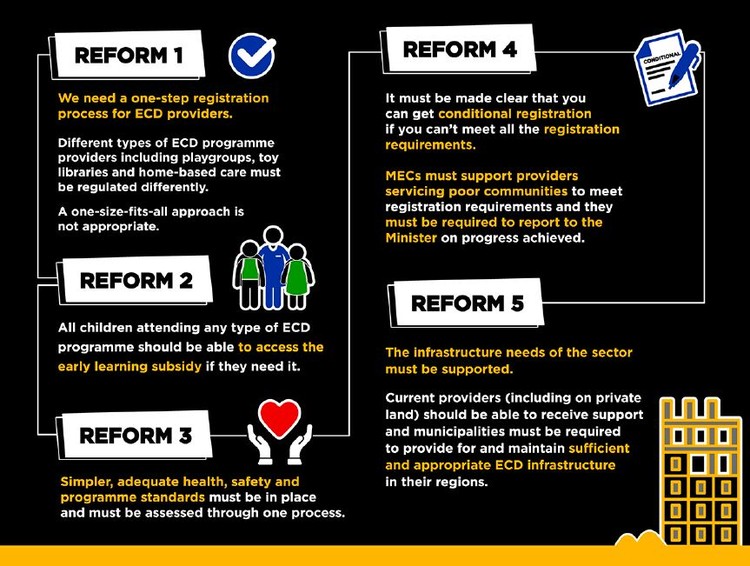Municipalities must play their role in early childhood development
Local governments can change the policies that are hampering the development of South Africa’s children
The Five Reforms proposed by Real Reform for ECD to bring about access to well-funded, inclusive and quality early childhood development services for all children.
The future of South Africa’s children is being hindered by onerous, unrealistic, and unaffordable regulations about early childhood development (ECD) at municipal level, including the registration of crèches.
Research shows that what happens during the early years of a child’s life can have effects that last a lifetime. This is the time when the child develops valuable skills and attitudes which will contribute to lifelong learning. These skills include the acquisition of language, learning to read and write, problem-solving skills, and basic numeracy.
White Paper 5 on Early Childhood Development states that “while there is this growing consensus that what happens during the early months and years have dramatic consequences for the rest of childhood and adolescence, our children across the country and the world are most neglected in our policies, programmes and budgets”. The paper goes on to emphasise “early childhood development should merit higher priority attention”. This document was published in 2001. But two decades later, local policies and budgets do not reflect the needs of this sector.
Registration regulations are onerous, unrealistic, and unaffordable; there is a lack of support for infrastructure development; and funding is almost non-existent. Challenges include complicated land-use requirements (zoning), excessive costs for building plans, high fees for basic services and municipal costs, as well as onerous health and safety requirements. These problems can all be fixed by local government.
Schedule 4B of the Constitution gives local governments the legislative authority to pass legislation and policy relating to child care facilities. The Constitution also gives local governments authority over municipal planning, which includes the regulation of land use for child care facilities.
Moreover, the National Integrated Early Childhood Development Policy states that “local municipalities must participate in the planning of early childhood development services”. The policy says local governments are responsible for supporting childcare facilities to meet minimum infrastructural health and safety standards; for development of new infrastructure for ECD services; and for identification of available infrastructure that may be used for the expansion of early learning services and programmes in areas of need.
In terms of Section 25 of the Municipal Systems Act, each municipal council must adopt a single, inclusive and strategic plan called an Integrated Development Plan (IDP), which outlines the municipality’s development plan for that council’s five-year term of office. The IDP guides and informs all planning and development in a municipal area. Therefore, if early childhood development is not included in the IDP, local municipalities will not prioritise it.
This is why Real Reform for ECD (RR4ECD) has prioritised local governments in advocating for early childhood development. The “Make Local Government Work For ECD” campaign calls for early childhood development services to be prioritised in local governments’ development plans, policies and budgets.
So far nearly 490 ECD practitioners have been included in workshops on the role of local government in ECD, and on how to make submissions to local government IDPs. They are keen to learn about local government processes to become active participants in advocating for ECD services and realising the right to ECD for all children.
However it has become clear that some municipal officials are not clear about their role in early childhood development plans. More work needs to be done to show that some specific reforms can and should be implemented at local government level, for example, pulling down the barriers to registration for ECD programmes, easing land use regulations, building more ECD programmes and upgrading existing programmes, and making ECD a local spending priority.
Community participation is the cornerstone of local governance. A better relationship between childhood development practitioners and local government officials is a way to achieve development goals.
Working with local government cannot be a singular ‘event’, and one email submission to the IDP is often insufficient. It takes painstaking relationship building, technical support, and a lot of hand-holding.
This is worth the effort because it is crucial to the well-being of our young children and of future generations.
Views expressed are not necessarily GroundUp’s.
Support independent journalism
Donate using Payfast

Don't miss out on the latest news
We respect your privacy, and promise we won't spam you.
Next: The student activist who gaslit workers and cost them their jobs
Previous: “Brave” bus company boss “resisted” Mbalula and taxis
© 2022 GroundUp. This article is licensed under a Creative Commons Attribution-NoDerivatives 4.0 International License.
You may republish this article, so long as you credit the authors and GroundUp, and do not change the text. Please include a link back to the original article.
We put an invisible pixel in the article so that we can count traffic to republishers. All analytics tools are solely on our servers. We do not give our logs to any third party. Logs are deleted after two weeks. We do not use any IP address identifying information except to count regional traffic. We are solely interested in counting hits, not tracking users. If you republish, please do not delete the invisible pixel.

